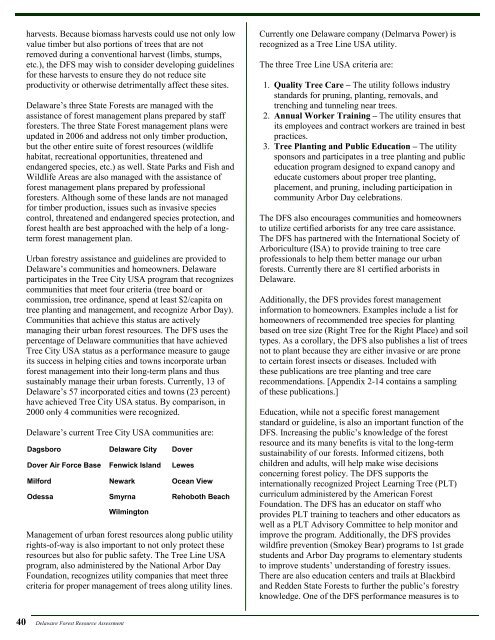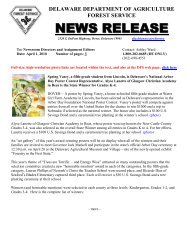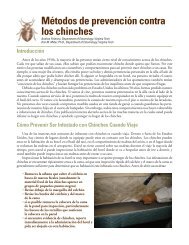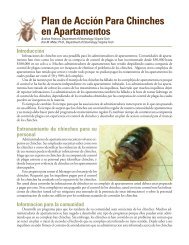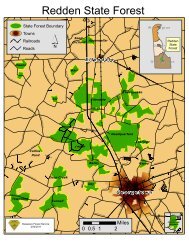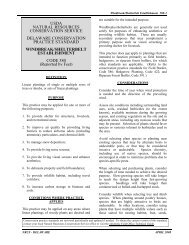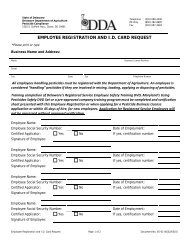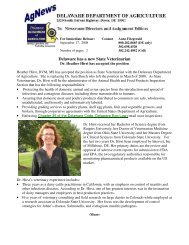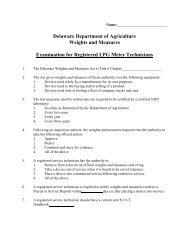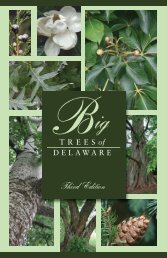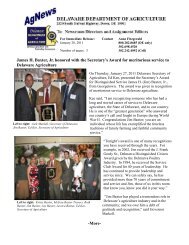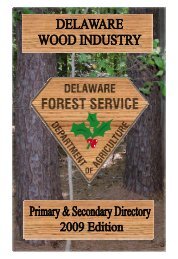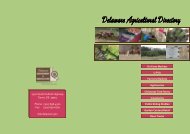DFS Resource Assessment - Delaware Department of Agriculture
DFS Resource Assessment - Delaware Department of Agriculture
DFS Resource Assessment - Delaware Department of Agriculture
Create successful ePaper yourself
Turn your PDF publications into a flip-book with our unique Google optimized e-Paper software.
harvests. Because biomass harvests could use not only low<br />
value timber but also portions <strong>of</strong> trees that are not<br />
removed during a conventional harvest (limbs, stumps,<br />
etc.), the <strong>DFS</strong> may wish to consider developing guidelines<br />
for these harvests to ensure they do not reduce site<br />
productivity or otherwise detrimentally affect these sites.<br />
<strong>Delaware</strong>’s three State Forests are managed with the<br />
assistance <strong>of</strong> forest management plans prepared by staff<br />
foresters. The three State Forest management plans were<br />
updated in 2006 and address not only timber production,<br />
but the other entire suite <strong>of</strong> forest resources (wildlife<br />
habitat, recreational opportunities, threatened and<br />
endangered species, etc.) as well. State Parks and Fish and<br />
Wildlife Areas are also managed with the assistance <strong>of</strong><br />
forest management plans prepared by pr<strong>of</strong>essional<br />
foresters. Although some <strong>of</strong> these lands are not managed<br />
for timber production, issues such as invasive species<br />
control, threatened and endangered species protection, and<br />
forest health are best approached with the help <strong>of</strong> a longterm<br />
forest management plan.<br />
Urban forestry assistance and guidelines are provided to<br />
<strong>Delaware</strong>’s communities and homeowners. <strong>Delaware</strong><br />
participates in the Tree City USA program that recognizes<br />
communities that meet four criteria (tree board or<br />
commission, tree ordinance, spend at least $2/capita on<br />
tree planting and management, and recognize Arbor Day).<br />
Communities that achieve this status are actively<br />
managing their urban forest resources. The <strong>DFS</strong> uses the<br />
percentage <strong>of</strong> <strong>Delaware</strong> communities that have achieved<br />
Tree City USA status as a performance measure to gauge<br />
its success in helping cities and towns incorporate urban<br />
forest management into their long-term plans and thus<br />
sustainably manage their urban forests. Currently, 13 <strong>of</strong><br />
<strong>Delaware</strong>’s 57 incorporated cities and towns (23 percent)<br />
have achieved Tree City USA status. By comparison, in<br />
2000 only 4 communities were recognized.<br />
<strong>Delaware</strong>’s current Tree City USA communities are:<br />
Dagsboro <strong>Delaware</strong> City Dover<br />
Dover Air Force Base Fenwick Island Lewes<br />
Milford Newark Ocean View<br />
Odessa Smyrna Rehoboth Beach<br />
Wilmington<br />
Management <strong>of</strong> urban forest resources along public utility<br />
rights-<strong>of</strong>-way is also important to not only protect these<br />
resources but also for public safety. The Tree Line USA<br />
program, also administered by the National Arbor Day<br />
Foundation, recognizes utility companies that meet three<br />
criteria for proper management <strong>of</strong> trees along utility lines.<br />
Currently one <strong>Delaware</strong> company (Delmarva Power) is<br />
recognized as a Tree Line USA utility.<br />
The three Tree Line USA criteria are:<br />
1. Quality Tree Care – The utility follows industry<br />
standards for pruning, planting, removals, and<br />
trenching and tunneling near trees.<br />
2. Annual Worker Training – The utility ensures that<br />
its employees and contract workers are trained in best<br />
practices.<br />
3. Tree Planting and Public Education – The utility<br />
sponsors and participates in a tree planting and public<br />
education program designed to expand canopy and<br />
educate customers about proper tree planting,<br />
placement, and pruning, including participation in<br />
community Arbor Day celebrations.<br />
The <strong>DFS</strong> also encourages communities and homeowners<br />
to utilize certified arborists for any tree care assistance.<br />
The <strong>DFS</strong> has partnered with the International Society <strong>of</strong><br />
Arboriculture (ISA) to provide training to tree care<br />
pr<strong>of</strong>essionals to help them better manage our urban<br />
forests. Currently there are 81 certified arborists in<br />
<strong>Delaware</strong>.<br />
Additionally, the <strong>DFS</strong> provides forest management<br />
information to homeowners. Examples include a list for<br />
homeowners <strong>of</strong> recommended tree species for planting<br />
based on tree size (Right Tree for the Right Place) and soil<br />
types. As a corollary, the <strong>DFS</strong> also publishes a list <strong>of</strong> trees<br />
not to plant because they are either invasive or are prone<br />
to certain forest insects or diseases. Included with<br />
these publications are tree planting and tree care<br />
recommendations. [Appendix 2-14 contains a sampling<br />
<strong>of</strong> these publications.]<br />
Education, while not a specific forest management<br />
standard or guideline, is also an important function <strong>of</strong> the<br />
<strong>DFS</strong>. Increasing the public’s knowledge <strong>of</strong> the forest<br />
resource and its many benefits is vital to the long-term<br />
sustainability <strong>of</strong> our forests. Informed citizens, both<br />
children and adults, will help make wise decisions<br />
concerning forest policy. The <strong>DFS</strong> supports the<br />
internationally recognized Project Learning Tree (PLT)<br />
curriculum administered by the American Forest<br />
Foundation. The <strong>DFS</strong> has an educator on staff who<br />
provides PLT training to teachers and other educators as<br />
well as a PLT Advisory Committee to help monitor and<br />
improve the program. Additionally, the <strong>DFS</strong> provides<br />
wildfire prevention (Smokey Bear) programs to 1st grade<br />
students and Arbor Day programs to elementary students<br />
to improve students’ understanding <strong>of</strong> forestry issues.<br />
There are also education centers and trails at Blackbird<br />
and Redden State Forests to further the public’s forestry<br />
knowledge. One <strong>of</strong> the <strong>DFS</strong> performance measures is to<br />
40 <strong>Delaware</strong> Forest <strong>Resource</strong> <strong>Assessment</strong>


